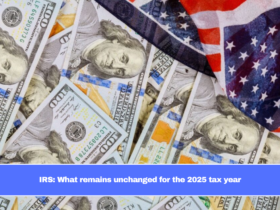The taxes on income from retirement are complicated. Typically, when people in the United States consider their wages after they have retired from their jobs, they only consider Social Security.
However, the majority of people also have income from their 401(k), individual retirement account (IRA), or pension income, which they must also take into consideration.
When it comes to the majority of these alternative kinds of payment, depending on where you live, there are taxes associated to them.
ALSO SEE : $300 cut in Social Security Benefits – Date already confirmed and could come sooner than expected
There are a number of states in the United States that do not tax retirement income at the same rate, and in other instances, they do not tax it at all.
If you want to be able to make ends meet, it is essential to be aware of which areas provide more favorable tax rates and to be able to migrate to such jurisdictions, often even before you retire.
With that being said, you will always be required to pay some kind of tax, whether it be sales taxes (with the exception of Alaska, Delaware, Montana, New Hampshire, and Oregon) or property taxes if you own a home.
There are a few choices available to you if, on the other hand, you are only interested in ensuring that the sum of money that you receive on a monthly basis remains as unaltered as feasible.
States that don’t have an income tax
Individuals who reside in the states of Alaska, Florida, Nevada, New Hampshire, South Dakota, Tennessee, Texas, Washington, or Wyoming will not be required to pay any income tax. This exemption is not limited to retirement income.
Having said that, if you live in any of these states, you will need to take into consideration a few quirks that are exclusive to those states.
Notwithstanding the fact that New Hampshire does not have a tax on income, the state does impose taxes on dividends and interest.
However, if you have other investments, you will need to investigate your profits because these taxes do not apply to dividend and interest income that is received from an individual retirement account (IRA) or a 401(k).
The state of New Hampshire will eliminate these taxes in stages after the year 2024, which means that beginning in April, you won’t have to be concerned about them anymore.
As an additional illustration, the state of Washington is one that imposes taxes on capital gains and is anticipated to continue doing so. This is due to the fact that voters in the state rejected an initiative that would have eliminated the taxes.
States that tax income but not retirement income

In addition to the nine states that do not impose any taxes on income, there are four additional states that do not impose taxes on retirement income.
These states include Illinois, Iowa, Mississippi, and Pennsylvania. Retirement income in these states includes money earned from Social Security, 401(k) plans, IRAs, or pensions. In these, regular income is nevertheless subject to taxation.
There are several peculiarities that must be taken into consideration. For instance, in the states of Mississippi and Pennsylvania, early distributions are not considered to be income associated with retirement and may be subject to taxation.
Retirement income from 401(k) plans and individual retirement accounts (IRAs) is subject to taxation in Alabama; however, Social Security retirement benefits and pension income from defined benefit retirement plans are exempt from taxation.
This provides a reprieve to individuals who rely on government funding or pensions to support themselves.
The peculiarity of Hawaii is that it does not impose taxes on any retirement distributions from private or public pension plans as long as retirees do not contribute to the plans.
This also means that retirement plans that include contributions from employees are only subject to taxation on the portion of the plan’s value that has increased as a result of the contributions made by employees.
States where Social Security isn’t taxed
Despite the fact that the majority of states do not impose taxes on Social Security benefits, the remainder of your retirement income may be subject to taxation.
This is excellent news for the majority of Americans. In addition to the thirteen states that have already been mentioned, the remaining states that do not impose taxes on these benefits are as follows:
Alabama, Arizona, Arkansas, California, Delaware, Georgia, Hawaii, Idaho, Indiana, Kansas, Kentucky, Louisiana, Maine, Maryland, Massachusetts, Michigan, Missouri, Nebraska, New Jersey, New York, North Carolina, North Dakota, Ohio, Oklahoma, Oregon, South Carolina, Virginia, and Wisconsin.
Because some states have individual regulations that mean that the remaining portion of your retirement income is still subject to taxation.
It is important to verify what other policies a state has that could potentially have a negative influence on your plans before you make a decision about where you want to reside.















Leave a Reply